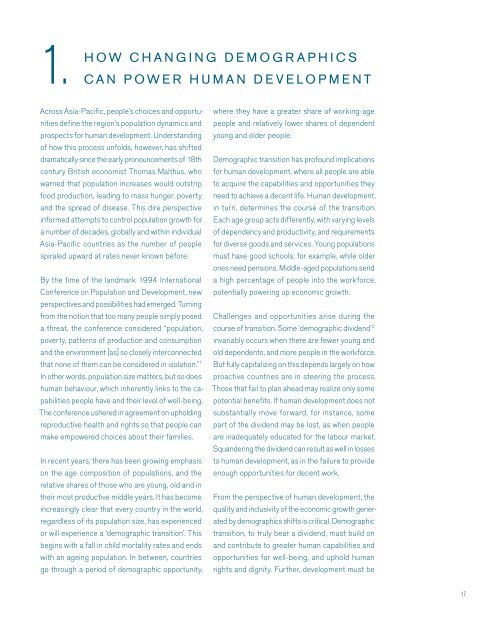SHAPING THE FUTURE HOW CHANGING DEMOGRAPHICS CAN POWER HUMAN DEVELOPMENT
1VPo4Vw
1VPo4Vw
You also want an ePaper? Increase the reach of your titles
YUMPU automatically turns print PDFs into web optimized ePapers that Google loves.
1.<br />
<strong>HOW</strong><br />
<strong>CHANGING</strong> <strong>DEMOGRAPHICS</strong><br />
<strong>CAN</strong> <strong>POWER</strong> <strong>HUMAN</strong> <strong>DEVELOPMENT</strong><br />
Across Asia-Pacific, people’s choices and opportunities<br />
define the region’s population dynamics and<br />
prospects for human development. Understanding<br />
of how this process unfolds, however, has shifted<br />
dramatically since the early pronouncements of 18th<br />
century British economist Thomas Malthus, who<br />
warned that population increases would outstrip<br />
food production, leading to mass hunger, poverty<br />
and the spread of disease. This dire perspective<br />
informed attempts to control population growth for<br />
a number of decades, globally and within individual<br />
Asia-Pacific countries as the number of people<br />
spiraled upward at rates never known before.<br />
By the time of the landmark 1994 International<br />
Conference on Population and Development, new<br />
perspectives and possibilities had emerged. Turning<br />
from the notion that too many people simply posed<br />
a threat, the conference considered “population,<br />
poverty, patterns of production and consumption<br />
and the environment [as] so closely interconnected<br />
that none of them can be considered in isolation.” 1<br />
In other words, population size matters, but so does<br />
human behaviour, which inherently links to the capabilities<br />
people have and their level of well-being.<br />
The conference ushered in agreement on upholding<br />
reproductive health and rights so that people can<br />
make empowered choices about their families.<br />
In recent years, there has been growing emphasis<br />
on the age composition of populations, and the<br />
relative shares of those who are young, old and in<br />
their most productive middle years. It has become<br />
increasingly clear that every country in the world,<br />
regardless of its population size, has experienced<br />
or will experience a ‘demographic transition’. This<br />
begins with a fall in child mortality rates and ends<br />
with an ageing population. In between, countries<br />
go through a period of demographic opportunity,<br />
where they have a greater share of working-age<br />
people and relatively lower shares of dependent<br />
young and older people.<br />
Demographic transition has profound implications<br />
for human development, where all people are able<br />
to acquire the capabilities and opportunities they<br />
need to achieve a decent life. Human development,<br />
in turn, determines the course of the transition.<br />
Each age group acts differently, with varying levels<br />
of dependency and productivity, and requirements<br />
for diverse goods and services. Young populations<br />
must have good schools, for example, while older<br />
ones need pensions. Middle-aged populations send<br />
a high percentage of people into the workforce,<br />
potentially powering up economic growth.<br />
Challenges and opportunities arise during the<br />
course of transition. Some ‘demographic dividend’ 2<br />
invariably occurs when there are fewer young and<br />
old dependents, and more people in the workforce.<br />
But fully capitalizing on this depends largely on how<br />
proactive countries are in steering the process.<br />
Those that fail to plan ahead may realize only some<br />
potential benefits. If human development does not<br />
substantially move forward, for instance, some<br />
part of the dividend may be lost, as when people<br />
are inadequately educated for the labour market.<br />
Squandering the dividend can result as well in losses<br />
to human development, as in the failure to provide<br />
enough opportunities for decent work.<br />
From the perspective of human development, the<br />
quality and inclusivity of the economic growth generated<br />
by demographics shifts is critical. Demographic<br />
transition, to truly bear a dividend, must build on<br />
and contribute to greater human capabilities and<br />
opportunities for well-being, and uphold human<br />
rights and dignity. Further, development must be<br />
17


